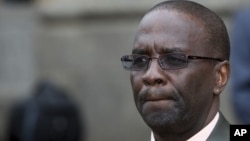NAIROBI - Kenyan judges are appearing before the Judges and Magistrates Vetting Board, set up under the new constitution to clean up the country’s judiciary -- a process which may unearth, and ultimately resolve, some of the country's long-buried scandals.
Kenya’s nine Court of Appeal judges were the first to be put under the microscope starting at the end February. On April 25, vetting board Chairman Sharad Rao announced that four Court of Appeal judges - Riaga Omollo, Samuel Bosire, Emmanuel O’Kubasu and Joseph Nyamu - were found to be unfit to hold their offices, while the other five were cleared.
Part of Bosire and Nyamu’s cases were linked to the so-called Goldenberg scandal of the 1990s, in which the Kenyan government subsidized exports of gold largely smuggled from Congo. Kenya lost an estimated 10 percent of its annual gross domestic product through that corruption.
In Omollo’s case, he was accused of being authoritarian, inconsistent and failing to show impartiality under former President Daniel arap Moi, while O’Kubasu is said to have accepted bribes.
Mwalimu Mati, chief executive officer of the government watchdog Mars Group, hopes that what emerges from the hearings will motivate officials to prosecute those implicated in past scandals.
“One of the judges found himself in trouble over his handling of cases in which accused persons over the 1982 attempted coup d’etat were treated," said Mati. "The accused in those cases were tortured, and in many cases, their confessions were extracted by torture. So in a way the new vetting processes are giving the hope that there will be a fresh impetus to deal with the past.”
The Judges and Magistrates Vetting Board was created under Kenya’s 2010 constitution to clean up a judiciary that has long been viewed as being corrupt and inefficient.
Apollo Mboya, chief executive officer of the Law Society of Kenya, explains that the “final straw” was the widespread violence and destruction in early 2008 that followed Kenya’s disputed elections.
“It was clear that what contributed to the violence in Kenya was, among other things, lack of confidence in the judiciary, so that you find that the politicians who were competing for positions could not ventilate their problems in the judiciary because of corruption that was in the judicial system,” Mboya said.
He says he thinks the public approves of the process so far and will slowly start putting their trust in the judicial system as more corruption is brought to light and more judges are dismissed.
The public vetting process is a sign of the times, said Mati from Mars Group.
“In the past, many people would have been too afraid of retribution to participate in any such process, but this first round with the court of appeal judges has, I think, opened a floodgate," he said. "There are very many judges against whom many, many complaints have been spoken about in whispers. So now I think it is coming out to the public limelight.”
Unlike Mati, the Law Society of Kenya’s Mboya believes that, in itself, the vetting process will probably not be enough to spark action on old, unresolved corruption and human rights cases. Mboya thinks high-level Kenyan officials lack what he calls the “political will” to prosecute such cases, adding that the Law Society and others will need to pressure the government before any action is taken.
The vetting board has already come under fire from some quarters.
The Judges and Magistrates Vetting Board has no power to review past decisions of judges other than in extreme cases, said High Court advocate Moses Chelanga.
“The judges have what I call 'independence,'" he said. "They have independent judicial minds to make decisions towards certain directions, and, if any party is aggrieved or do not agree with that decision, then they can appeal. A judge can only be suspended if he is clearly wrong, if the wrong is so open, if the wrong is glaring on the face of the record.”
Chelanga said the board is relying on what he described as “implication, innuendos and guesswork” because the public and even lawyers are not bringing forth enough hard evidence to support complaints. He fears judges may be penalized in future if they make unpopular rulings.
The vetting of high court judges, which began in late April, is expected to wrap up by the end of November.









